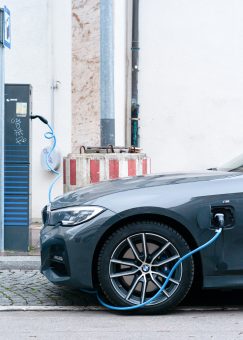
The U.S. Department of Energy (DOE) today announced $200 million in funding over the next five years for electric vehicles, batteries, and connected vehicles projects at DOE national labs and new DOE partnerships to support electric vehicles innovation.
“We’re focusing on the entire battery supply chain from soup to nuts — from sustainable mining and processing to manufacturing and recycling — which will translate to thousands of new jobs across the country and put more clean-running electric vehicles on the road,” said Acting Assistant Secretary Kelly Speakes-Backman. “We want to establish global leadership at each level of the supply chain, and I am so excited for the possibilities.”
The $200 million in funding to national labs, subject to appropriations, seeks to make electric vehicle innovations in order to decarbonize the transportation sector, the top source for greenhouse gas emissions in the United States. The funding is open to DOE’s network of 17 national laboratories and is administered by DOE’s Vehicle Technologies Office.
This funding compliments VTO’s funding opportunity of $62 million for reducing emissions and increasing efficiencies for on- and off-road vehicles, announced in April 2021. Projects will require applicants to submit a plan for achieving diversity, equity, and inclusion objectives, including support for people from underrepresented groups in STEM, advancing equity within the project team, and producing benefits for underserved communities.
More:
Secretary of Energy Jennifer M. Granholm announced the funding at a roundtable discussion on strengthening the domestic advanced battery supply chain, which followed recommendations from the recently released National Blueprint for Lithium Batteries 2021–2030.
Advanced, lithium-based batteries play an integral role in 21st century technologies such as electric vehicles, stationary grid storage, and defense applications that will be critical to securing America’s clean energy future. Today, the U.S. relies heavily on importing advanced battery components from abroad, exposing the nation to supply chain vulnerabilities that threaten to disrupt the availability and cost of these technologies, as well as the workforce that manufactures them.
The blueprint, developed by the Federal Consortium for Advanced Batteries (FCAB), underscores the need for strong collaboration across the federal government, U.S. academic institutions, national laboratories, industrial stakeholders, and international allies.
DOE’s efforts to strengthen the domestic lithium battery supply chain will also support the Energy Storage Grand Challenge (ESGC). The ESGC is a comprehensive program to accelerate the development, commercialization, and utilization of next-generation energy storage technologies and sustain American global leadership in energy storage.
Source: Clean Technica



